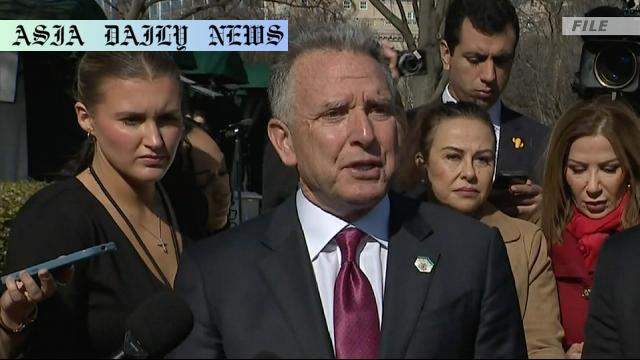Iran-US Peace Talks: US envoy confirms readiness for comprehensive peace, highlights uranium enrichment ban as a red line.
The US seeks a comprehensive peace deal with Iran while banning uranium enrichment.
US envoy Witkoff remains optimistic about Iran’s readiness to negotiate.
President Trump emphasizes peace efforts and normalization of ties in the Middle East.

Introduction: US-Iran Relations at a Critical Juncture
The long-standing tensions between the United States and Iran appear to be at a pivotal point as fresh talks are set to commence. US President Donald Trump and Middle East Envoy Steve Witkoff have outlined their intent to pursue a comprehensive peace agreement with Iran, signaling a hopeful yet guarded moment in the region’s history. The announcement comes on the heels of a cessation in the recent Israel-Iran clashes, indicating a window of opportunity for dialogue and diplomacy. However, the United States has made it clear that any potential accord hinges on Iran’s commitment to abandon its uranium enrichment program and the pursuit of nuclear weapons, marking these actions as non-negotiable red lines.
The Core Objective: Stabilizing the Middle East
At the heart of these negotiations lies a broader strategy to normalize relations between Israel and Arab nations, a measure aimed at fostering regional stability. Witkoff emphasized that Trump’s administration is actively engaging with Arab states to bring them into alignment with US peace initiatives. This diplomatic effort not only seeks to mitigate hostilities between Iran and its regional neighbors but also to create a collaborative framework for economic and geopolitical stability. Witkoff’s assertion that there will be significant announcements regarding new participants in the peace process underscores the strategic importance of multilateral cooperation in addressing longstanding animosities in the Middle East.
The Red Line: A Contested Point of Negotiation
The United States’ unwavering stance on preventing Iran’s nuclear weaponization forms the bedrock of its negotiation strategy. Witkoff labeled this issue as a destabilizing force for the entire region, reflecting broader international concerns about nuclear escalation. The insistence on halting uranium enrichment highlights the complexities and stakes involved in these discussions, given Iran’s historical persistence on maintaining its nuclear program for what it claims to be peaceful purposes. Navigating this critical point will require deft negotiation skills and mutual compromises without compromising on security imperatives.
Challenges Ahead: Building Trust and Securing Commitment
While optimism surrounds the upcoming talks, substantial hurdles remain. The history of mistrust between the US and Iran complicates efforts to reach a middle ground. Iran’s geopolitical ties with other nations that may oppose US influence in the region further add layers of complexity to the peace process. Moreover, questions linger regarding Iran’s willingness to forgo its nuclear ambitions completely, given its perception of such capabilities as a leverage point in international relations. The negotiations will need to incorporate mechanisms to ensure transparency and verify compliance to build lasting trust between the parties involved.
Conclusion: A Path Towards Hope and Diplomacy
The prospect of a comprehensive peace deal with Iran signifies a potential turning point for global diplomacy. The United States’ commitment to addressing nuclear concerns while fostering regional dialogue underscores the delicate balance required to broker peace in one of the world’s most volatile regions. As talks progress, the outcome will serve as a testament to the power of negotiation and international cooperation amid complex challenges. Observers worldwide will undoubtedly be keeping a close eye on these developments, hopeful for resolutions that pave the way for stability and prosperity in the Middle East.



Commentary
The Significance of US-Iran Peace Efforts
The prospect of a US-Iran peace agreement marks a significant step forward in addressing some of the most pressing global security concerns. For decades, the relationship between these two nations has been punctuated by conflicts, mistrust, and missed opportunities. However, the latest diplomatic initiative signals a shift in priorities, offering a glimmer of hope for fostering stability in a region often characterized by volatility. At the same time, it reflects the complexities and challenges inherent in brokering peace amidst historical grievances and competing interests.
Potential Benefits of a Comprehensive Agreement
Should a peace deal be achieved, the ramifications would extend far beyond the US and Iran. The stabilization of the Middle East, improved security for Israel, and stronger economic ties between Arab countries and the broader global community are just a few of the positive outcomes that could emerge. Normalizing relations between Israel and Arab nations also sets a vital precedent for collaborative problem-solving in addressing shared regional challenges. Moreover, curtailing Iran’s nuclear program would alleviate concerns not just in the region but across the world, especially among nations that perceive nuclear proliferation as an existential threat.
Challenges and Considerations in Negotiating Peace
That said, achieving such a deal is no easy task. The US and Iran have diametrically opposed views on numerous issues, most notably Iran’s pursuit of nuclear technology. Moreover, geopolitical relationships and domestic pressures in both countries add layers of complexity to any potential agreement. For the US, maintaining its credibility with allies like Israel while seeking to engage Iran creates a delicate balancing act. For Iran, the negotiation process will likely be influenced by internal political factions and external relationships with other global players such as Russia and China.
A Delicate Path Forward
The upcoming talks between the US and Iran represent an opportunity for change that must be approached with both caution and optimism. The outcomes will likely hinge on the ability of both nations to communicate effectively, compromise where possible, and ensure mutual respect for the non-negotiable elements of each party’s stance. While challenges abound, the potential for progress offers a sense of hope in a region that has long yearned for peace and stability.